Diplomatic Bluebook 2022
Chapter 2
Japan's Foreign Policy by Region
3 LAC Countries (See 2 (3) for CARICOM Countries)
(1) Mexico
President Andrés Manuel López Obrador, who was inaugurated in December 2018, is halfway through his six-year term and continues to have a high approval rating among the public in 2021. In June, large scale midterm elections were held involving federal deputies and 15 state governors. The ruling coalition led by the National Regeneration Movement (MORENA) lost a few seats in the Chamber of Deputies, but retained its majority.
Even after the spread of COVID-19, the current administration has not adopted mandatory measures such as lockdowns, but has implemented measures prioritizing the avoidance of the collapse of the medical system. Particular emphasis has been placed on securing vaccines since the end of 2020, and vaccine administration in the country has been promoted since the beginning of 2021.
In terms of Mexico's relations with the U.S., the U.S.-Mexico High-Level Economic Dialogue and the U.S.-Mexico High-Level Security Dialogue (ministerial level) were respectively held in September and October. In November, for the first time in five years, a trilateral summit meeting with the U.S. and Canada was held in Washington, D.C.
In July 2021, a ministerial-level meeting of the three countries was held in Mexico City to commemorate the first anniversary of the entry into force of the United States-Mexico-Canada Agreement (USMCA). In regard to relations with Japan, economic relations have been increasingly strengthened in recent years, and Mexico has become Japan's largest economic base in the LAC region, with 1,300 Japanese companies operating in the country. In January 2021, Foreign Minister Motegi visited Mexico and held meetings with Secretary of Foreign Affairs Marcelo Ebrard and Secretary of Economy Tatiana Clouthier. During the meetings, Foreign Minister Motegi confirmed the further strengthening of strategic cooperation with Mexico, which has close relations with the U.S. where a new administration has been formed. It was also reaffirmed that Japan would cooperate on various international and regional issues with Mexico, which will be a member of the UN Security Council in 2021 and 2022. Foreign Minister Motegi also called for the business environment in Mexico to be further improved and stabilized, requested support for the Japanese companies operating in Mexico amid COVID-19, and confirmed continued cooperation for the steady implementation and expansion of the TPP11 Agreement and the realization of World Trade Organization (WTO) reform.
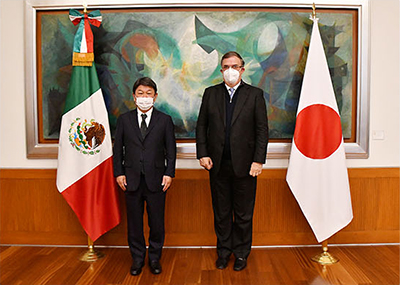 Japan-Mexico Foreign Ministers' Meeting (January 4, Mexico)
Japan-Mexico Foreign Ministers' Meeting (January 4, Mexico)(2) Central America (El Salvador, Guatemala, Costa Rica, Dominican Republic, Nicaragua, Panama, Belize and Honduras)
Foreign Minister Motegi visited Guatemala and Panama in July. In Guatemala, he paid a courtesy call to the President and held a Foreign Ministers' Meeting. He also held the Japan-SICA (Central American Integration System) Foreign Ministers' Meeting, as well as a Japan-El Salvador Foreign Ministers' Meeting and a Japan-Costa Rica Foreign Ministers' telephone call, and exchanged views with the foreign ministers of eight Central American countries. In Panama, he also paid a courtesy call to the president and held a Foreign Ministers' meeting. Through these visits, Foreign Minister Motegi exchanged views with Central American countries, with which Japan has traditionally had friendly relations, regarding cooperation for the maintenance and expansion of a free and open international order based on the rule of law as well as measures to address the challenges facing the international community, including COVID-19 countermeasures.
In Nicaragua, presidential elections were held in November, and President Daniel Ortega won his fourth consecutive election. However, criticism from the international community grew over the fact that the election was held while many opposition party candidates and others were arrested and detained. Honduras also held a presidential election in November, and the leftist candidate Xiomara Castro won the election, becoming the country's first female president.
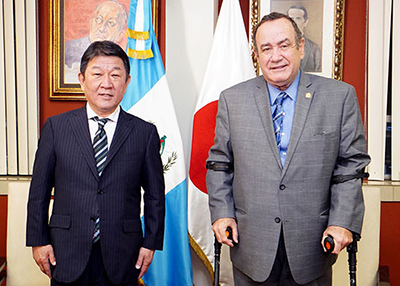 Foreign Minister Motegi pays a courtesy call to President Alejandro Eduardo Giammattei Falla of Guatemala
Foreign Minister Motegi pays a courtesy call to President Alejandro Eduardo Giammattei Falla of Guatemala (July 15, Guatemala)
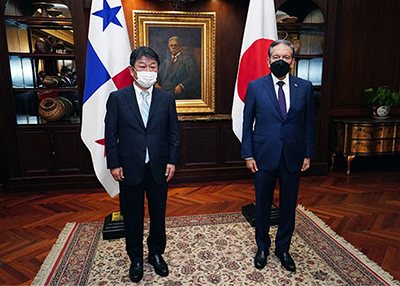 Foreign Minister Motegi pays a courtesy call to President Laurentino Cortizo Cohen of Panama (July 17, Panama)
Foreign Minister Motegi pays a courtesy call to President Laurentino Cortizo Cohen of Panama (July 17, Panama)(3) Cuba
Due to the global spread of COVID-19, Cuba's economy, including the major industry of tourism, was damaged, and the lives of the people became more difficult. On the other hand, with its high healthcare standards, Cuba developed its own vaccine, promoted domestic vaccine administration, and dispatched medical personnel to other countries. In July, a Japan-Cuba Foreign Ministers' telephone call was held to discuss COVID-19 countermeasures, bilateral relations, and international affairs.
(4) Brazil
While President Jair Bolsonaro has been criticized for his COVID-19 countermeasures, he has not changed his stance of emphasizing the importance of the economy since taking office and has been advancing reform such as deliberation on tax reform legislation and privatization.
In terms of relations with Japan, although there were restrictions on mutual visits by dignitaries due to COVID-19, Foreign Minister Motegi visited Brazil in January and reaffirmed the shared fundamental values such as democracy, as well as the traditional bonds of Nikkei people, with the Bolsonaro administration, which is pursuing new diplomacy emphasizing cooperation with Japan and the U.S. In February, Minister of Communications Fábio Faria visited Japan and met with State Minister for Internal Affairs and Communications Shintani Masayoshi. They exchanged views on the efforts and collaboration directions of both countries in the ICT and digital field, including 5G, and agreed to further strengthen cooperative bilateral relations going forward. In October, the 9th Japan-Brazil Policy Consultation was also held between Secretary for Bilateral Negotiations in Asia, the Pacific, and Russia Márcia Donner Abreu, who was visiting Japan, and Senior Deputy Minister for Foreign Affairs Suzuki Hiroshi. The two representatives discussed policies to strengthen bilateral relations in political and economic aspects based on the “Japan-Brazil Strategic and Global Partnership,” responses to important issues in the international community including climate change and COVID-19, and regional situations. Furthermore, in December, Foreign Minister Hayashi and Foreign Minister Carlos França held a telephone call in which they confirmed close cooperation in various fields to further strengthen bilateral relations, and agreed on cooperation to realize a free and open international order based on the rule of law.
(5) Argentina
In the midterm legislative election held in November, the midpoint of the Alberto Fernández administration's (four-year) term, the ruling coalition's share of the vote fell below that of the opposition coalition, causing the ruling coalition (the Justicialist Party) to lose its majority in the Senate for the first time since the transition to democratic government in 1983. The Fernández administration has made it an urgent matter to respond to the debt problems with the International Monetary Fund (IMF) and others, as well as the economic recession, which was affected by COVID-19. The current administration's efforts to deal with the political and economic situation after the midterm election are garnering attention.
In terms of relations with Japan, Foreign Minister Motegi visited Argentina in January and held the first Japan-Argentina Foreign Ministers' Meeting since the inauguration of the Fernández administration. The ministers confirmed further strengthening of cooperation as “Strategic Partners” that share fundamental values. In addition, in December, Foreign Minister Hayashi and Foreign Minister Santiago Andrés Cafiero held a video conference, in which they agreed on cooperation to realize a free and open international order based on the rule of law, and confirmed close cooperation in various fields to further strengthen bilateral relations.
(6) Peru
In the presidential election held on April 11, amidst the absence of a strong political party or candidate, candidates Pedro Castillo (radical left) and Keiko Fujimori (center-right), who did not rank highly in preliminary polls, advanced to the run-off. The run-off vote was held on June 6, but after both candidates' camps appealed to invalidate some of the votes that had been counted, the Jurado Nacional de Elecciones (JNE) held deliberations. A month and a half later, candidate Castillo was finally announced as the winner on July 19. The Castillo administration, which was inaugurated on July 28, has been working on socialist economic policies, the convening of the Constitutional Assembly (constitutional reform), and the urgent issues of COVID-19 countermeasures and restoration of political stability. However, less than a month after the administration's inauguration, the foreign minister was replaced due to his past comments, and in October, the entire cabinet resigned due to the ouster of the prime minister. Although Vásquez's cabinet was given a vote of confidence by the National Assembly in November, President Castillo continues to face difficulties in running his administration.
On the other hand, on the diplomatic front, the TPP11 Agreement entered into force for Peru in September, and is expected to further strengthen the multilateral trade system based on free and fair trade rules. In terms of relations with Japan, the Japan-Peru tax treaty entered into force in January, and is expected to further promote investment and economic exchange between the two countries.
(7) Chile
In response to public protests demanding the correction of disparities and other issues triggered by the raising of subway fares in October 2019, elections for members of the Constitutional Convention were held in May 2021 and it was established in July 2021 in preparation for the enactment of a new constitution, which was approved by a referendum in October 2020. The Constitutional Convention will spend nine months (with a possible three-month extension) drafting a new constitution, and after a 60-day review period, a referendum is planned to be held to approve it. In addition, the presidential election was held at the end of the term, and the centrist party lost in the first round of voting due to dissatisfaction with policies under the centrist government that had been in power for 30 years. In the decisive vote in the December presidential election, the first run-off between the right and the left since the transition to democratic government, candidate Gabriel Boric (leftist), who seeks fundamental change to correct disparities, won the most votes in Chilean history at the young age of 35 against candidate José Antonio Kast (rightist), who places more emphasis on order and stability. The new administration will be inaugurated in March 2022.
In terms of relations with Japan, Minister of Energy and Mining Juan Carlos Jobet Eluchans visited Japan in November to exchange views on hydrogen cooperation.
(8) Uruguay
The Luis Lacalle Pou administration, which was inaugurated in March 2020, has continued to achieve results in the fight against COVID-19, including high vaccination rates, and has maintained a high approval rating.
The year 2021 marks the 100th anniversary of the establishment of diplomatic relations between Japan and Uruguay. In January, Foreign Minister Motegi made the first visit in 35 years to Uruguay as a Japanese Foreign Minister. Both countries issued commemorative stamps and carried out a variety of other commemorative projects. In addition, a tax convention and a Customs Mutual Assistance Agreement entered into force respectively in July and October, and further strengthening of economic relations is expected going forward (see the Column on page 115).
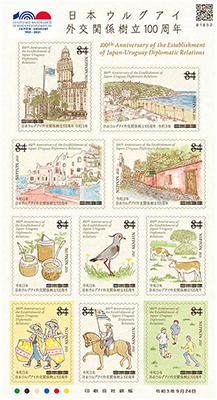 The special stamp for the “100th Anniversary of the Establishment of Diplomatic Relations between Japan and Uruguay” issued on September 24, 2021
The special stamp for the “100th Anniversary of the Establishment of Diplomatic Relations between Japan and Uruguay” issued on September 24, 2021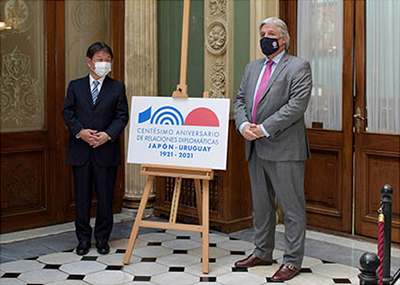 Foreign Minister Motegi and Minister of Foreign Relations Bustillo unveiling the “Commemorating 100 Years since the Establishment of Diplomatic Relations between Japan and Uruguay” logo (January 6, Montevideo, Uruguay)
Foreign Minister Motegi and Minister of Foreign Relations Bustillo unveiling the “Commemorating 100 Years since the Establishment of Diplomatic Relations between Japan and Uruguay” logo (January 6, Montevideo, Uruguay)In 2021, a variety of initiatives were undertaken to mark 100 years since the establishment of diplomatic relations between Japan and Uruguay. This column provides a new introduction to Uruguay, which, despite being located on the other side of the world to Japan, has deepened bonds with Japan through engagement across a wide range of fields.
■Uruguay: A small but brilliantly sparkling country
The best way to describe Uruguay in one phrase is likely “a small but brilliantly sparkling country.” With a territory around half the size of Japan and a population smaller than Yokohama City, it is small in scale, but one of the most politically, socially, and economically stable countries in Latin America. This position is quantified by Uruguay being rated number one in Latin America in both the Democracy Index and the Rule of Law Index, as well having the highest per capita GDP in South America.
Its main industries are agriculture and forestry, with cattle breeding particularly successful. Notably, the number of cows (11.88 million) and sheep (6.34 million) are significantly higher than the number of people, being more than three times and nearly twice as large respectively as the human population of 3.47 million. In addition to its traditional strength in hydropower, Uruguay has been actively promoting energy supply from wind, solar, and biomass, resulting in around 96% of its electricity supply now coming from renewable sources, making it well-known as a leader in renewable energy.
■A history of friendship
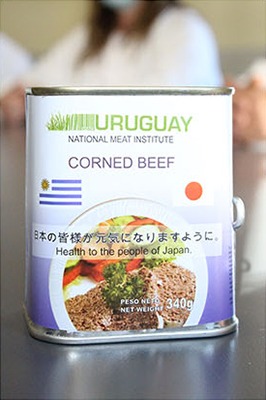 Corned beef delivered from Uruguay after the Great East Japan Earthquake
Corned beef delivered from Uruguay after the Great East Japan EarthquakeSince the first migrations from Japan to Uruguay in 1908, the two countries have engaged in exchange and cooperation across a wide range of fields. For example, through technical collaboration by the Japan International Cooperation Agency (JICA), Japan has welcomed trainees and sent Japanese specialists in many fields, notably forestry. In addition, Japan has backed initiatives investing in Uruguay's sustainable development through grants such as for Hikari, Uruguay's first solar power station. Through many years of exchange between the countries and thanks also to the great efforts of the Japanese Association in Uruguay in promoting the likes of martial arts and Japanese drumming (wadaiko), the country and culture of Japan are familiar to many Uruguayans. One demonstration of the bonds between the countries was when Japan was struck by an unprecedented disaster, the Great East Japan Earthquake. The Government of Uruguay sent warm messages in the Japanese language wishing for “everyone in Japan to be well,” followed by delivering a large number of cans of corned beef to the disaster-struck area.
■100 years since the establishment of diplomatic relations: Toward the next century
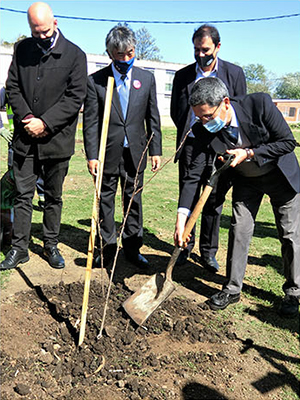 Planting cherry trees in La Paz city
Planting cherry trees in La Paz cityIn recent years, relations between Japan and Uruguay have followed a clear and steady development path. In 2018, Prime Minister Abe made the first visit to Uruguay by a Japanese Prime Minister, further strengthening relations between the two countries. As a result, the mutual ban on beef exports was lifted, meaning that both Japanese and Uruguayans can now experience the flavor of wagyu and Uruguayan-raised beef.
To mark the 100th anniversary of the establishment of diplomatic relations, in January 2021 Foreign Minister Motegi made the first visit in 35 years to Uruguay by a Japanese Foreign Minister. The two countries reaffirmed that they are important partners sharing fundamental values such as freedom, human rights, and the rule of law. Moreover, following on from the Japan-Uruguay Investment Agreement, which entered into force in 2017, the bilateral Tax Convention took effect in July 2021 and the Customs Mutual Assistance Agreement entered into force in October 2021, raising the prospect of further promoting economic relations between the two countries. In addition, a variety of events have been held in both countries to commemorate 100 years since the establishment of diplomatic relations. For example, Japan Post issued special stamps featuring iconic Uruguayan scenery and cultural symbols. In Uruguay, the Embassy of Japan organized commemorative projects such as planting cherry trees (sakura) in a range of locations, hosted a kimono exhibition in collaboration with the Museum of Pre-Columbian and Indigenous Art (MAPI), and assisted in the issuing of commemorative stamps. Through these initiatives marking 100 years, it is hoped that relations between the two countries will become even stronger.
(9) Paraguay
The Mario Abdo Benítez administration is continuing to maintain its “free and open economic policies.” Japan and Paraguay celebrated the centenary of their diplomatic relations in 2019, and have maintained friendly relations even during the spread of COVID-19, including due to the traditional bonds of 10,000 Nikkei people. In January 2021, Foreign Minister Motegi made the first bilateral visit to Paraguay as a Japanese Foreign Minister. Japan and Paraguay, which places particular importance on fundamental values such as freedom, democracy, and the rule of law, and has traditional bonds of Nikkei people, agreed to cooperate to maintain and strengthen the free and open international order. Furthermore, in November, Foreign Minister Euclides Acevedo Candia visited Japan as the first Paraguayan Foreign Minister to do so in five years, and Foreign Minister Hayashi held his first foreign minister's meeting with an LAC country since he assumed his position. The two foreign ministers confirmed that Japan and Paraguay are important partners that share fundamental values such as freedom, democracy, human rights, and the rule of law, and Foreign Minister Acevedo expressed support for the realization of FOIP, which Japan emphasizes.
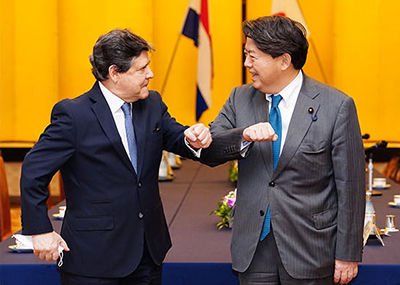 Japan-Paraguay Foreign Ministers' Meeting
Japan-Paraguay Foreign Ministers' Meeting (November 22, Tokyo)
(10) Colombia
President Iván Duque, who was inaugurated in August 2018, worked to implement the 2016 peace agreement in Colombia5 and has promoted anti-corruption measures, tax and pension reform, and the like. On the diplomatic front, Colombia held the presidency of the PA and the Forum of the Progress Integration of South America (PROSUR) in 2021.
In terms of relations with Japan, Vice President and Foreign Minister Marta Lucía Ramírez visited Japan in November, paid a courtesy call to Prime Minister Kishida, and held a meeting with Chief Cabinet Secretary Matsuno. It was agreed that Japan and Colombia would expand cooperation toward realizing FOIP in the LAC region.
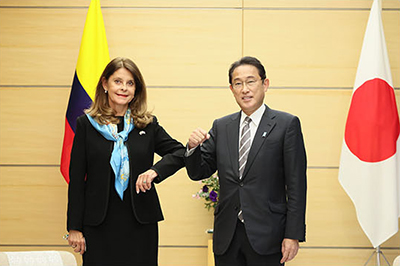 Prime Minister Kishida receiving a courtesy call by Vice President and Foreign Minister Marta Lucía Ramírez Blanco of the Republic of Colombia (November 9, Tokyo; Photo: Cabinet Public Relations Office)
Prime Minister Kishida receiving a courtesy call by Vice President and Foreign Minister Marta Lucía Ramírez Blanco of the Republic of Colombia (November 9, Tokyo; Photo: Cabinet Public Relations Office)- 5 Then-President Santos started the peace talks with the Revolutionary Armed Forces of Colombia (FARC), the largest guerilla organization in Colombia, in 2012 in order to end the domestic strife that had lasted for over half a century. The peace agreement was announced in 2016.
(11) Venezuela
The inauguration ceremony for President Nicolás Maduro was held in January 2019 amidst doubts about the legitimacy of the presidential election held in May 2018. During the same month, the President of the National Assembly Juan Guaidó was sworn in as Interim President based on the provisions of the constitution, which intensified conflict between the administration and the opposition party. In December 2020, the election for Venezuela's National Assembly was held without participation of the main opposition parties, and the Maduro administration's party was declared the winner. In response, people in Venezuela, including the main opposition party, as well as the international community reacted against the election, claiming that it lacked legitimacy. Similarly, Japan has been calling for the restoration of democracy in Venezuela through the early implementation of a free and fair election.
In August 2021, a dialogue between the ruling and opposition parties began in Mexico under the mediation of Norway to overcome this situation. However, it was temporarily suspended in October when a Venezuelan diplomat who had been arrested in Cabo Verde was extradited to the U.S. In addition, in November, nationwide local elections were held, and the outcome was the focus of attention as the EU deployed an election observation mission. The situation in Venezuela continues to be disordered, as the elections were assessed to have structural shortcomings, including arrests for political reasons and arbitrary disqualification of candidates to participate in the elections.
Moreover, due to the worsening economic, social, and humanitarian situation in the country, Venezuelan nationals have been flowing into neighboring countries as refugees and immigrants, and receiving them has become a regional challenge. Japan has been providing support to the Venezuelan people, including people fleeing from Venezuela, as well as to the neighboring countries affected.
(12) Bolivia
In November 2019, after President Evo Morales resigned and fled Bolivia,6 the pro-U.S. right-wing interim government of Jeanine Áñez was formed. However, candidate Luis Alberto Arce, who served as former Minister of Economy and Public Finance during the Morales administration, won the presidential election held in October 2020. In the following November, the Arce administration was formed, restoring a leftist government after about a year. In March 2021, former interim President Áñez and several members of the interim administration were arrested on charges of terrorism, sedition, and conspiracy.
- 6 During the October 2019 presidential election, the incumbent candidate President Evo Morales (in office since 2006), who had declared his victory, resigned and fled Bolivia in November due to protests, alienation from the military and police, and other factors because of suspicions of fraud in the election procedure.
(13) Ecuador
The presidential election in February was a crowded contest among 16 candidates, with the top three candidates being Andrés Arauz (from the faction of former President Rafael Correa), Guillermo Lasso (a right-wing banker), and Yaku Pérez (a candidate of indigenous descent). In April, candidate Lasso won the run-off election with 52.4% of the vote, and was inaugurated as president in May. The Lasso administration has declared that it will strengthen relations with the U.S., the EU, and other Western countries, as well as with the IMF and other international financial institutions. It aims to stimulate the economy through the promotion of free trade and the attraction of foreign investment. On the other hand, the ruling Creating Opportunities Party has only 12 out of 137 seats in the unicameral National Assembly, and smooth legislative management is an issue.
In terms of relations with Japan, State Minister for Foreign Affairs Uto visited Ecuador in July and confirmed that the two countries' traditional friendly bilateral relations will be further strengthened through close cooperation under the new administration.
(14) Collaboration with the Nikkei Community
The Nikkei community has fostered a sense of affinity toward Japan in LAC countries. Nevertheless, generations have transitioned over 100 years since Japanese immigration to LAC countries began, thus how to deepen ties to Japan among the community, including among the younger generation, has become a challenge. Amid this situation, in addition to inviting young Nikkei people to visit Japan, Japan also implements measures toward strengthening collaboration with the Nikkei community, through supporting events by young Nikkei people in various countries for creating networks among them. In February 2021, the supplementary budget allocated 2.4 billion yen to support Nikkei communities by subsidizing through the Japan International Cooperation Agency (JICA) the cost of supporting medical and welfare facilities operated by Nikkei organizations affected by the COVID-19 epidemic.
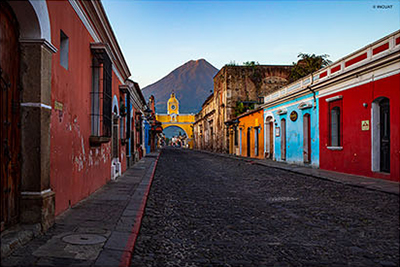 Antigua is a World Heritage City in Guatemala. Japan provides ODA for the protection of many cultural assets in the LAC region, including this World Heritage site. (@INGUAT)
Antigua is a World Heritage City in Guatemala. Japan provides ODA for the protection of many cultural assets in the LAC region, including this World Heritage site. (@INGUAT)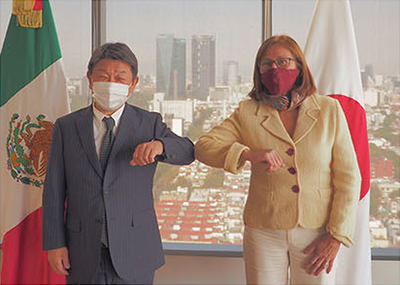 Meeting between Foreign Minister Motegi and Secretary of Economy Clouthier (January 5, Mexico)
Meeting between Foreign Minister Motegi and Secretary of Economy Clouthier (January 5, Mexico)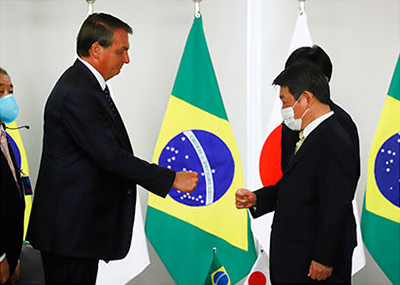 Courtesy call to President Bolsonaro by Foreign Minister Motegi (January 4, Brazil)
Courtesy call to President Bolsonaro by Foreign Minister Motegi (January 4, Brazil)The year 2021 was a year of deepening relations between Japan and the Latin America and the Caribbean (LAC) region. Many people may remember that during the Olympic and Paralympic Games Tokyo 2020, Cuban boxers won the most medals in four boxing weight classes and the Brazilian team won the seventh most gold medals in the world at the Paralympic Games. There was also a heartwarming behind-the-scenes story of the Jamaican athlete who took the wrong bus to the competition venue, but made it in time to compete and won the gold medal thanks to a Japanese staff member. In addition, despite the restrictions due to the COVID-19 pandemic, exchanges among host towns also took place.
In the field of diplomacy, the year 2021 was an important year for Japan-LAC relations. While face-to-face diplomacy was constrained, Foreign Minister Motegi visited Mexico, Uruguay, Argentina, Paraguay, and Brazil in January, as well as Guatemala, Panama and Jamaica in July. It was the first time in history that a Japanese Foreign Minister visited as many as eight LAC countries. Foreign Minister Motegi held both in-person and online regional dialogues with eight Central American countries during his visit to Guatemala, and with 14 Caribbean countries during his visit to Jamaica. Furthermore, the Vice President and Foreign Minister of Colombia as well as the Foreign Minister of Paraguay visited Japan in November. Given that many other online meetings between Japan and LAC countries were also held, it has been an unprecedented year of close dialogue.
Behind this close dialogue, there are common issues to the international community that Japan and the LAC region should address together. During dialogues with various countries, Japan explained its initiatives for a “Free and Open Indo-Pacific (FOIP)” and called for the expansion of such initiatives as well as cooperation to maintain and expand the free and open international order based on the rule of law. Japan also appealed for cooperation in the international arena, including the United Nations, to confront global challenges such as COVID-19, natural disasters and climate change. Furthermore, Japan called for improving the business environment for Japanese companies operating in LAC countries. The in-person, in-depth discussions among the foreign ministers were particularly fruitful, and Japan was able to gain the understanding and cooperation of various countries on all of these important issues.
Despite the geographical distance, there is a foundation for such in-depth communication between Japan and the LAC region. The Nikkei (Japanese immigrants and their descendants) have been serving as a “bridge” to foster a sense of affinity toward Japan in these countries for over 100 years. The presence of Nikkei people continues to be very important to this day. In addition, many LAC countries share fundamental values such as freedom, democracy, the rule of law and human rights. Many of the countries, including the Caribbean island nations, place importance on the free and open maritime order. They also share with Japan a high incidence of natural disasters such as earthquakes, volcanic eruptions and hurricanes, and we have received much appreciation for cooperation in disaster risk reduction and other areas that leverage Japan's expertise.
Furthermore, as one of the world's leading producers of minerals, energy and food resources, the LAC region has built up mutually complementary trade relations with Japan. As a series of economic partnership agreements has been concluded in recent years, the region has become increasingly important as a manufacturing base supporting the global supply chain, and Japanese companies are increasingly expanding into the region. Recently, technological innovations in areas such as telecommunications have expanded the possibilities for cooperation, and it is expected to deepen the cooperation for clean energy and green economies.
On the other hand, LAC countries also face serious challenges. In addition to problems such as security and natural disasters, long-standing challenges such as corruption remain in some countries, and structural issues including inequality and poverty have been a drag on development and a destabilizing factor in regional affairs. The damage caused by COVID-19, which is more serious in the region than in other parts of the world, is further exacerbating this situation.
Japan has been strengthening its ties (connectivity) with the LAC region under the guiding principle of the three “Juntos!!” (Together!!), which are to progress together by deepening economic relations, to lead together in the international arena, and to inspire together by promoting people-to-people exchanges. At a time when the world and LAC countries are facing difficulties, we will further strengthen our long-standing friendly relations through close dialogues that transcend distance, and walk forward together as partners who share values while combining our wisdom in addressing new challenges.


